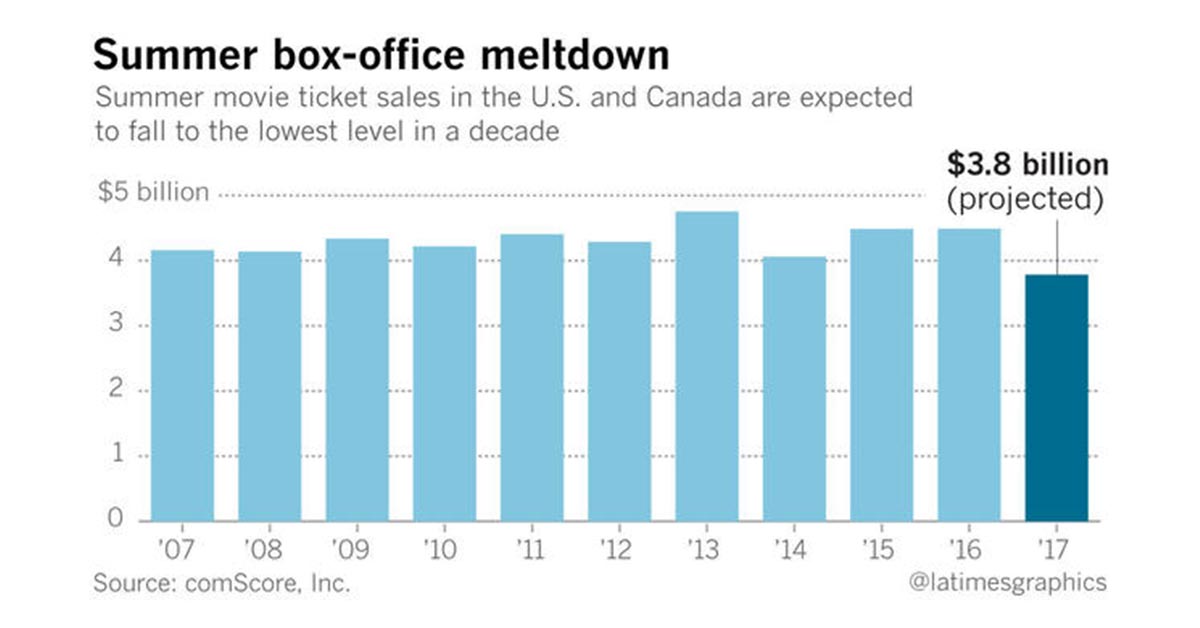I was sitting in church the other night and my pastor happened to make a side-remark about how bad Hollywood films are right now. And that single thought got me thinking. “Why are we experiencing a dying Hollywood right now?” In my research, I couldn’t help but think about how some of these factors in the creative industry could affect the church at large if we’re not careful.
So I want to walk us through the 4 lessons from a dying Hollywood and how it affects each of us in the Church. If we can learn from these lessons, I think we can become stronger organizations, who serve our communities with more clarity and greater strength. Don’t believe Hollywood is in a downfall? Take a look at this chart from LA Times, showing that this summer will be the lowest projected ticket sales in over 10 years.

Before we start, I want to make a key point. The church is not the same as Hollywood. The church should not become Hollywood. We’re not called to entertain and grow fans. We’re called to share eternal-life-altering truth and help people connect with Jesus Christ. So as I break down these points, keep in mind that I’m not trying to make us as the Church any more like Hollywood.
Too Much of the Same.
Never before have we had this high of a percentage of remakes, sequels and hero-based films (that aren’t remakes or sequels) compared to total releases of movies. That causes a problem. There’s very little originality and new stories. Even when those new films make it to production, the culture is already so dissatisfied with all the re-makes, that they’ve written off movies all together.
WHAT WE CAN LEARN: In the church, are we telling the same story, the same way, too often? Part of our mission in the church is to tell a timeless story in a timely way, and this is where you the creative community are given the keys to the kingdom. Lets avoid those 10 year old sermon series ideas, ditch the same ole design tactics that we’ve said “well, it works.” and challenge the status quo. In a world that’s choosing film production because it’s “guaranteed creativity”, take more risks and figure out a new way to tell a great story.
[bctt tweet=”Our mission in the church is to tell a timeless story in a timely way…” username=”@lukemcelroy”]
No Longer Worth It.
Think about when you last went to see a movie in a movie theatre? What did it cost you? How about your entire family? Movie tickets are at an all time high. Movie theaters are charging a premium for popcorn, candy, sodas and food! It’s nearly impossible to go to a movie without forking over $20-30 now. For one movie, you can buy Netflix, Hulu and your favorite premium channel’s subscription service.
WHAT WE CAN LEARN: It’s almost too easy to stay at home. From 4k televisions and low cost HD Televisions, getting people out of their house is becoming a more regular challenge. What are you doing as a creative team, and a church leadership team to help make it easier to getting to church? Are our greeters genuinely getting to know those who attend? Is community a priority? All of these are indirect “costs” that an individual may incur when they try to come to church. How do you make sure that it costs less when someone comes to your Church?
[bctt tweet=”What are you doing to help make it easier to getting to church?” username=”@lukemcelroy”]
Streaming & Subscriptions
It’s almost too easy to watch great stories online. First it was YouTube. Then it was Netflix DVDs, then Netflix streaming. Now you have Hulu, HBO, Showtime, Amazon Prime, Apple Music, YouTube Red, Movies Anywhere… the list goes on and on. Online content is so well done, and so easy to access, that the mere online streaming services are in such abundance and quality that no one wants to go see a movie with other people.
WHAT WE CAN LEARN: I wonder if the push to streaming our services online have created a higher quality, easier to access, and abundant access to teaching, that it’s causing some of your own community to distance itself from community? If you’re stream is a better experience than the real-life service, then you’re going to become like the NFL. Where watching the game on tv is better than in person because of the yellow line technology. How are you encouraging your online community to connect with others in their area? What does the internet campus do when it comes to children ministry, youth ministry and small groups? Make sure you don’t canalize your own ministry by providing your teaching in abundance online.
No Family Focus
According to IMDB, the five most popular films of 2017 are (in this order): Blade Runner (R), IT (R), Kingsman: The Golden Circle (R), Professor Marston and the Wonder Women (R), and The Dark Town (PG-13). What do you notice from this list? Not a single G or PG film. Not a single family friendly movie. In fact, only one of these films is rated PG-13, and assumes that everyone who goes to movies is over 18 (with the “R” rating). Hollywood has lost it’s focus on the family, and that’s like loosing group tickets (since most families would buy 3-5 tickets at a time).
WHAT WE CAN LEARN: The family is still the single most important aspect of the church community. What are you doing to make sure that the creative energy and technical engineering that you are investing into your community is just as focused on the family than the adult? Is your creative team spending a decent portion of your time investing in projects with the youth ministry or children’s staff? Or is all of your energy being poured into the main service, alienating the families and splitting them up on a Sunday morning?
[bctt tweet=”Hollywood has lost it’s focus on the family.” username=”@lukemcelroy”]
Obviously some of these are pretty broad and overarching statements of the church, and again, I don’t intend to use this as a way to argue that the church should be any more like Hollywood. I just think there are some things we can learn from the downdraught of the film industry right now. I think there are lessons we can pull from the dying Hollywood season we’re in, and help become a better collective of churches who are wanting to reach our communities.


